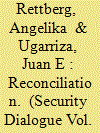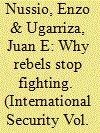|
|
|
Sort Order |
|
|
|
Items / Page
|
|
|
|
|
|
|
| Srl | Item |
| 1 |
ID:
190861


|
|
|
|
|
| Summary/Abstract |
Ex-combatants, war victims, and violence-affected community members are typically forced to live together as neighbors in post-conflict settings. Cases all over the world accumulate evidence on the fact that living together after war is a far from a harmonic endeavor, and individuals usually rely on contention mechanisms to keep on with their daily lives while in proximity of former and present-day antagonists. While decades-long academic research has unveiled a series of favorable conditions under which interactions might generate positive effects on intergroup dispositions, they usually prescribe focusing less on touching upon divisive issues, and more on emphasizing in potentially bonding commonalities. By means of a randomized controlled experiment with former war antagonists in Colombia, we set to explore whether avoidance or addressing of the most sensitive issues affecting intergroup relations yield better results in terms of attitude change under favorable conditions. Experimental effects show that perspective-giving protocols are capable of containing polarization tendencies in intergroup discussions even when participants are incentivized to directly address their co-existence problems, while qualitative analysis points out at silences and other avoidance mechanisms as the participants’ key strategies to contain conflict when contentious topics flare up during discussions.
|
|
|
|
|
|
|
|
|
|
|
|
|
|
|
|
| 2 |
ID:
149482


|
|
|
|
|
| Summary/Abstract |
There appears to be a rift between the theoretical and normative understandings of what reconciliation means and offers, and what people expect to happen in postconflict scenarios. Here we present a conceptual framework that captures the definitional diversity surrounding the concept of reconciliation and then operationalizes it in order to analyze responses from postconflict populations. The illustrative application of our framework to responses from a representative survey of 1,843 Colombian citizens reveals that people’s convictions are just as diverse as scholars’. Nevertheless, significant proportions of respondents seem to understand reconciliation to be primarily a psychological and political process which aims to achieve the re-establishment of quotidian or day-to-day relations and cooperation; which should be preceded by the cessation of violence, dialogue, goodwill, and attitudinal and emotional change; and which should be accompanied by social welfare and security. It is noteworthy that understandings of reconciliation as a process mediated by justice, truth, and memory are scarce. The application of this framework will help to reveal differences between hopes and promises, and inform scholarly work and policymaking that is more realistically rooted.
|
|
|
|
|
|
|
|
|
|
|
|
|
|
|
|
| 3 |
ID:
119958


|
|
|
|
|
| Publication |
2013.
|
| Summary/Abstract |
This article counterclaims that ideology lacks relevance to contemporary armed conflicts, especially when economic factors play an important role. Focusing on the case of Colombia, the authors utilize logistic regression analysis to test whether ideology allows one to distinguish between different armed groups and whether a combatant's level of agreement with his or her armed group is related to affinity for that group's ideology. The high degree of collinearity between three indicators of ideology-discourse, attitudes, and emotional responses-and their similar explanatory power support the article's conceptual proposal of viewing them as different dimensions of the same phenomenon. The authors find that ideology continues to play a role in the internal dynamics of Colombian armed groups and that a combatant's ideological development is influenced not only by pre-enlistment experiences but also by participation in a particular group. Future research should not ignore ideology as an important element of contemporary armed conflicts.
|
|
|
|
|
|
|
|
|
|
|
|
|
|
|
|
| 4 |
ID:
177845


|
|
|
|
|
| Summary/Abstract |
Desertion, or the unauthorized exit from an armed group, has major implications for counterinsurgency, war termination, and recruitment dynamics. While existing research stresses the importance of individual motivations for desertion, organizational decline, in the form of military and financial adversity, can also condition desertion. Organizational decline undermines a group's instruments to channel individual preferences into collective action. These instruments include selective incentives, ideological appeal, and coercion. When the binding power of these instruments diminishes, individual desires start to dominate behavior, making desertion more likely. The Revolutionary Armed Forces of Colombia (FARC) insurgency is used to examine this argument with a multimethod approach. First, a quantitative analysis employs unique data on more than 19,000 reported FARC deserters from 2002 to 2017, provided by the Colombian Ministry of Defense. Guarding against threats to causal inference, statistical analysis indicates that organizational decline drives desertion. Second, a qualitative analysis uses a large body of detailed reports on interviews with deserters conducted by Colombian military personnel. The reports demonstrate that organizational decline weakens selective incentives, group ideology, and a credible coercive regime, and fosters desertion through these mechanisms. These findings provide key insights for policymakers, given that desertion can both contribute to ending conflict and accelerate the recruitment of new combatants.
|
|
|
|
|
|
|
|
|
|
|
|
|
|
|
|
|
|
|
|
|